French Election: Macron Emerges Victorious; Analysts Weigh In (Live Blog)
Emmanuel Macron has been declared the next president of France, despite eleventh-hour twists leading up to Sunday's runoff.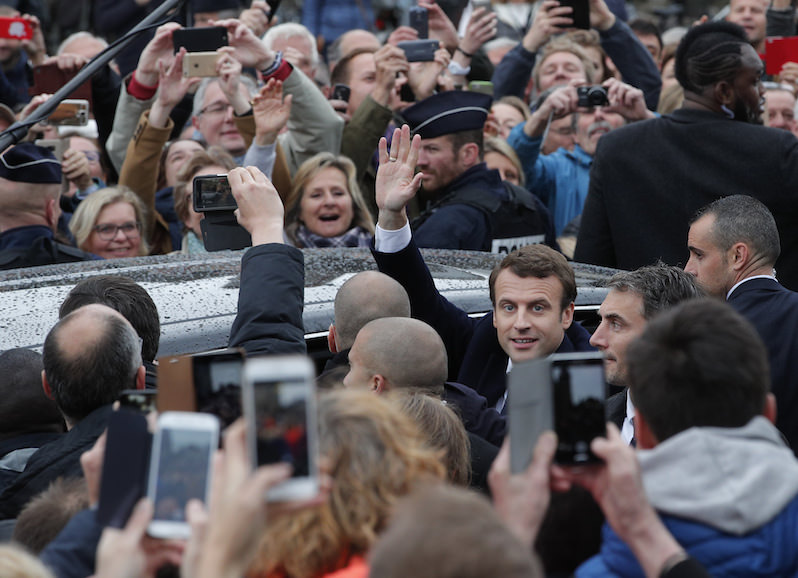 Emmanuel Macron meets a crowd as he leaves a polling station in Le Touquet, France, on Sunday. (Thibault Camus / AP)
Emmanuel Macron meets a crowd as he leaves a polling station in Le Touquet, France, on Sunday. (Thibault Camus / AP)
Emmanuel Macron meets a crowd as he leaves a polling station in Le Touquet, France, on Sunday. (Thibault Camus / AP)
4:27 p.m. PDT Sunday: Watch France’s newly minted next president claim victory in the video below. In his post-election speech, Emmanuel Macron sounded a note of unity and directly addressed the voters who did not side with him: “I know why some people have chosen to vote for an extreme party — I understand that,” he said. “It is therefore my responsibility to take them on board, to heed them”:
1:20 p.m. PDT Sunday: The last-minute shake-ups failed to cause an upset for Emmanuel Macron, who will soon be referred to as President Macron. His challenger from the right, Marine Le Pen, conceded the election in a speech Sunday.
The Washington Post brought word of Macron’s win following the official declaration:
In a speech to the nation, Macron said the country had “turned a new page in our long history. I want it to be a page of renewed hope and trust.”
The president-elect also reached out to Le Pen voters, saying he could understand their anger, while vowing to defend both France and Europe. “This is our civilization that’s at stake, our way of life,” he said.
Macron was expected to speak again later Sunday night in the grand courtyard of Paris’s Louvre Museum, where news of his win spawned raucous cheers among thousands of flag-waving Macron backers.
Watch Le Pen’s concession speech:
Macron, who has marketed himself as something of a political outsider, has become the ultimate insider as France’s chief executive. He’ll also have to carve out a definitive stance on a number of pressing issues; being the pro-European, anti-Le Pen option will not carry him as far as president-elect as it did as a candidate. CNN’s James Masters on Sunday took stock of Macron’s profile and prospects in office:
At the age of 39, with no party to back him and no experience of elected office, many in the political classes dismissed his candidacy as a publicity stunt. Prime Minister Manuel Valls — who would go on to fail in his own attempt for the Élysée Palace — had described Macron as “populism lite,” while Francois Fillon, the Republican candidate whose campaign was derailed by scandal, said he was certain the French public would “not place their fate in the hands of a man with no experience, who had demonstrated nothing.” …
But with the vote over, the French public will quickly expect Macron to bring a sense of unity to the fractured country.
For many, the election was about the desire for a shift away from the current political classes, which many feel have left them behind.
Beset by high unemployment, a stagnant economy, concerns around immigration and security fears following a spate of terror attacks, Macron will take the helm in France a difficult time.
Meanwhile, the BBC’s Hugh Schofield chalked up no small margin of Macron’s success to his charm, recalling conversations about Barack Obama in the 2008 American presidential election cycle, as well as those about current U.S. President Donald Trump — at least with regard to his flair for performance:
Will his charm still work?
Aye, but there’s the rub.
Usually when someone is described as “plausible”, that is when the first alarm-bells start sounding. “Plausible” is only a short step from “too plausible”. And suddenly we are in the land of snake-oil.
Emmanuel Macron’s central brilliance is built on a self-belief which would be narcissistic were it not directed at public life.
But if there is a question over Emmanuel Macron, it is over this sense of specialness that surrounds him. …
His gift for language and performance (remember it was in a theatre class that he and Brigitte fell for each other) has given him a power of persuasion that is second to none. Allied to the force of conviction that is his, and it is almost irresistible.
But often with Macron one fears that (in a way that is very French) it is words that are doing his work.
Finally, The Guardian’s Angelique Chrisafis predicted that, despite Sunday’s defeat, Le Pen’s party isn’t about to fade into the background:
Political scientists have warned that no one should write off the French far right after Marine Le Pen’s presidential loss. The Front National has slowly been gaining ground for the last 45 years and its steady electoral increases must be seen in the long term. The issues that the party has sought to focus on and capitalise from – the terrorist threat, the refugee crisis, immigration, mass unemployment, deindustrialisation, voters who struggle to make ends meet – are unlikely to instantly disappear.
“The Front National is not finished,” said Jean-Yves Camus, director of the Observatory of Radical Politics at the Jean-Jaurès foundation in Paris. “We have no reason to believe that the job market will change for the better in the next few years. We have no reason to believe that the negative impact of globalisation will stop during the years to come. So there might be a drop in the Front National vote, but if the situation is bad in 2022 [at the time of the next presidential election], they could rise again.”
For the nation, it’s vive la France — and for Macron, bon chance.
–Posted by Kasia Anderson
7:30 a.m. PDT Sunday: France’s presidential election is underway, and, at each turn, it gets stranger and stranger. Polls opened across France on Sunday morning as, for the first time in the European country’s history, two candidates from outside the traditional party structure are up for election. And they’re not any two candidates, either: They are Marine Le Pen, a far-right xenophobe who originally campaigned as head of the National Front party founded by her father, and Emmanuel Macron, a 39-year-old former investment banker and Minister of Economy, Industry and Digital Affairs who, if elected, will be the youngest French president ever. What’s more, the entire European Union project hangs in the balance, as Le Pen’s anti-EU stance could very well mean the end of the Union.
And if all that doesn’t sound eventful and confusing enough, there’s this: Over the weekend, just as candidates were forced to stop campaigning in order to leave a day between campaigning and the elections, in accordance with French law, hackers leaked emails (some allegedly real; others allegedly doctored) from Macron’s En Marche! campaign.
French election authorities promptly warned internet users and the nation’s media that anyone who published the leaked content would face legal consequences.
From The Guardian:
France’s presidential electoral authority, the CNCCEP, asked the media to avoid transmitting information from the leaked documents and reminded them of their responsibilities given the “seriousness of the election”.
“This attack has resulted in the publication of a number of important documents presented as having come from the information system of the candidate and the message accounts of certain of their campaign officials on certain social networks,” it wrote after the meeting on Saturday. “The commission stresses that the dissemination or republication of such information, fraudulently obtained and which may, in all likelihood, have been mixed with false information, is liable to be classified as criminal in several respects for which its authors will be held responsible.”
It added: “On the eve of the most important electoral deadline for our institutions, we call on all actors present on websites and social networks, first and foremost the media, but also all citizens, to show a spirit of responsibility and not relay the contents of these documents in order not to alter the integrity of the vote, not to break the bans laid down by the law and not to expose themselves to the committing of criminal offences.”
But Truthdig contributor Juan Cole argues that hackers will probably have little to no effect on the election results, while another group certainly has. According to Cole, the terrorist group Islamic State has done more to put Le Pen at the head of France than any hackers could have.
— Posted by Natasha Hakimi Zapata
Your support matters…Independent journalism is under threat and overshadowed by heavily funded mainstream media.
You can help level the playing field. Become a member.
Your tax-deductible contribution keeps us digging beneath the headlines to give you thought-provoking, investigative reporting and analysis that unearths what's really happening- without compromise.
Give today to support our courageous, independent journalists.

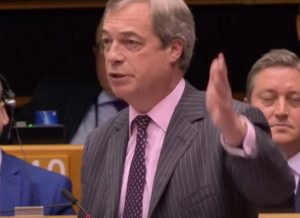
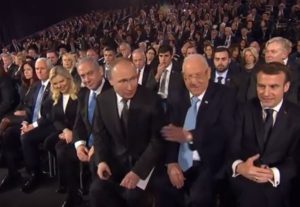
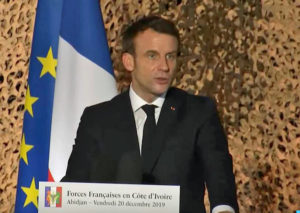

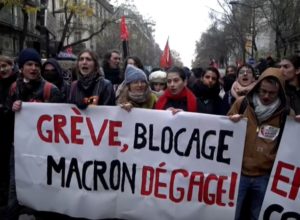
You need to be a supporter to comment.
There are currently no responses to this article.
Be the first to respond.